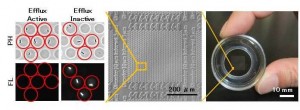The fight against multidrug resistant bacteria

The recent increase in multidrug resistance in clinically isolated bacteria is a major problem in infection control. Active efflux of drugs, such as antibiotics, from a cell is one of the major mechanisms that cause multidrug resistance in bacteria. Drug resistance caused by active efflux is conventionally assessed by measuring the minimal inhibitory concentration of the drug against bacterial growth. This is an indirect method, and in principle, cells can grow by mechanisms other than active efflux. The conventional method is not only indirect but also time-consuming because it requires overnight culture before obtaining the results. Researchers have long been looking for a direct, simple, and rapid method of evaluating bacterial drug efflux activity. Lecturer Iino and Professor Noji at the University of Tokyo’s Graduate School of Engineering, collaborating with Professors Nishino, Matsumoto and Yamaguchi at Osaka University, have developed a direct and sensitive method assessing the drug efflux activity of bacteria at the single-cell level. The method provides not only direct evaluation of drug efflux activity, but is simple and rapid, and takes only 15 minutes to obtain a result. Moreover, an efflux-active single cell can be easily collected and can be used for subsequent culture and gene analysis. This novel approach will be a useful tool to screen novel drug efflux protein inhibitors and efflux protein genes and to overcome infectious diseases caused by multidrug-resistant bacteria.
Paper
Ryota Iino, Kohei Hayama, Hiromi Amezawa, Shouichi Sakakihara, Soo Hyeon Kim, Yoshimi Matsumoto, Kunihiko Nishino, Akihito Yamaguchi, Hiroyuki Noji,
“A single-cell drug efflux assay in bacteria by using a directly accessible femtoliter droplet array”,
Lab on a Chip Online Edition: 2012/6/13 (Japan time), doi: 10.1039/C2LC40394C.
Article link
Links
Graduate School of Engineering







